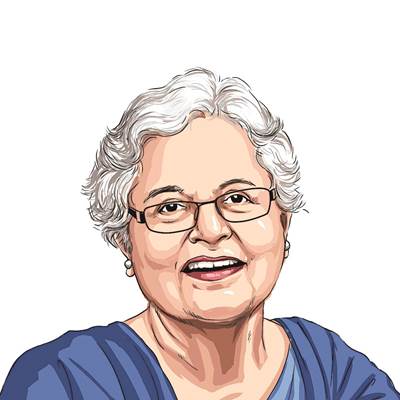Opinion State of revolving doors
A short history of Maharashtra through its colourful politics.
Politics in Maharashtra has become a byword for corruption,although ironically the ordinary people in the state have sustained a reputation for honesty,respect for the law and civic-mindedness. It is revealing that when Ashok Chavans continuance as Maharashtra chief minister became untenable,his two predecessors at the post from the Congress party,Vilasrao Deshmukh and Sushil Kumar Shinde,too were seen to be under a cloud and therefore not viable replacements.Since 1975,when Vasantrao Naik stepped down after 12 years in office,the Maharashtra chief ministers post has changed hands 15 times. No chief minister has completed a full term,though in the game of musical chairs some have held it twice,while Sharad Pawar was chief minister thrice. Besides Ashok Chavan,there have been others who were tainted by scandal and lost their jobs. The Antulay trust fund scam has become part of folklore. Shivajirao Nilangekar Patil used his clout to get his nieces medical examination results fixed. Manohar Joshi was accused of favouring relatives. Deshmukh finally had to quit after the November 26,2008 terrorist attack on Mumbai only when he was indiscreet enough to take film director Ram Gopal Varma on a guided tour of the devastated Taj Hotel,in what was seen as an act to oblige his film star son. Maharashtra was once one of the best-administered states in the country. But standards in governance,infrastructure and social welfare projects have over the last three decades slipped badly,thanks to a series of weak and venal governments. In contrast,neighbouring Gujarat,once united with Maharashtra as part of the erstwhile Bombay state,has shown distinct progress. Maharashtra was a pioneer in the cooperative movement,but now most cooperatives have been converted into the personal fiefdoms of politicians and are tailed by controversy. President Pratibha Patils family is among the states political dynasties with a questionable record in the cooperative sector. It is not surprising that the apex body in charge of Maharashtras cooperative banks was recently given the lowest ranking of D by an independent audit survey. If the Congress has been complacent about putting its house in order in Maharashtra,it is because the party,despite its poor record of governance,continues to somehow win elections. The TINA (there is no alternative) factor worked in its favour. The only alternative to the Congress-NCP is a rabble-rousing Shiv Sena,whose influence is largely restricted to the Mumbai region and the coastal belt. The Sena itself is now a divided house thanks to the machinations of the Congress,which propped up Raj Thackeray as a counter to his cousin,Uddhav. Its ally,the BJP,lacks charismatic leadership and has not been able to emerge as a credible alternative. It is reduced to playing second fiddle to the Sena. The cooperatives at the grassroots are still controlled largely by Congress and NCP politicians. But the opposition in Maharashtra too is heavily compromised a junior BJP leaders driver is an Adarsh society member and usually make only feeble noises over the state governments misrule. In fact,Bal Thackeray and Sharad Pawar make no bones about their special equation.The Congress has sought to explain its poor choices for chief minister in the past by blaming the obstructionism of its long-time ally,the NCP,which opposes any chief ministerial candidate perceived as a potential threat to its own survival in the state. But the Congress high command is itself suspicious of its Maharashtra state leaders. The Maratha satraps also have a history of switching sides overnight. Mumbai,the states capital and the countrys commercial hub,is viewed as a milch cow not just by state politicians but also by their respective central leaderships which,cynics believe,is why the Congress has condoned the shady antecedents of some of its chief ministers. In Maharashtra,for instance,the urban development portfolio has almost always been retained with the chief minister for obvious reasons. Prithviraj Chavan,an efficient,personable and experienced hand in the Central government who is seen as an honest politician,seems ideally suited to clean up this Augean stable. But sceptics wonder whether the state chieftains and the entrenched builder lobbies will permit an outsider a free hand. Pawar,who has often been at loggerheads with Prithviraj,has announced that the new deputy chief minister will be his combative nephew,Ajit Pawar. Clearly,Prithviraj will have an even more challenging role to play than that of a troubleshooter for the prime minister. He will have to tread on many powerful toes if he is to restore his partys tattered image.
coomi.kapoor@expressindia.com





